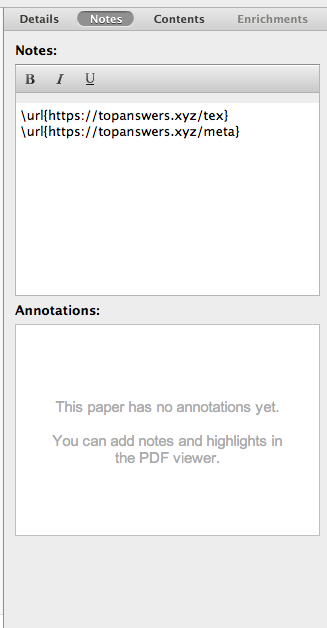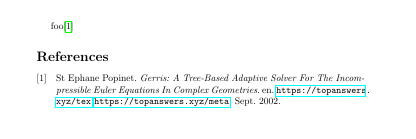Anonymous 1759

**Motivation**
It is often the case that I save multiple urls for the same Mendeley reference (for example, link to a paper and another link to its video or code) so that I can easily find just by clicking on it from Mendeley.
Also I want that I have all these links in the draft/presentation so that the readers can do the same.
But I couldn't figure out a nice *automated* way to do it. Of course, one way is to change `url` to `note` but there are various problems:
1. I don't find `note` in the available fields for most commonly used document types (conference proceedings, journal article and generic) in Mendeley.
2. I cannot make use of the simple functionality of click to open in Mendeley (Only available in URL in Mendeley)
3. It is indeed a lot of manual effort if I try to change each `url` to `note` in the generated `.bib` file
Hence, the solutions proposed in https://tex.stackexchange.com/questions/57865/how-to-use-multiple-urls-for-one-bibtex-reference are not useful. For instance, doing the following does not help. Any *automated* way of handling this would be great.
```
\RequirePackage{filecontents}
\begin{filecontents}{test3.bib}
@Misc{oai:CiteSeerPSU:562256,
title = "Gerris: {A} Tree-Based Adaptive Solver For The
Incompressible Euler Equations In Complex Geometries",
author = "St Ephane Popinet",
year = "2002",
month = sep # "~08",
URL = "http://citeseer.ist.psu.edu/562256.html http://gfs.sf.net/gerris.pdf http://gfs.sf.net/new.pdf",
}
\end{filecontents}
\documentclass{article}
\usepackage[english]{babel}
\usepackage{url}
\usepackage[backend=biber]{biblatex}
\usepackage{hyperref}
\addbibresource{test3.bib}
\let\URL\url
\makeatletter
\def\url#1{\@URL#1 \@nil}
\def\@URL#1 #2\@nil{\URL{#1}\ifx\relax#2\relax \else; \url{#2\relax}\fi}
\makeatother
\begin{document}
foo\cite{oai:CiteSeerPSU:562256}
\printbibliography
\end{document}
```
A solution for 2-3 references would also be fine. But the goal really is to do it in an automated way via the generated output from Mendeley (with `URL` field having single space between references)
Top Answer
samcarter

There are many different approaches to tackle this problem.
One approach could be to put the urls into Mendeleys separate "Notes" tab

(if you would like colons or any other formatting, just add it here)
This will appear in the `.bib` file as `annote` field. To use this with the default biblatex styles, you can map this to the `note` field:
```
\DeclareSourcemap{
\maps[datatype=bibtex,overwrite=true]{
\map{
\step[fieldsource=annote, final=true]
\step[fieldset=note, origfieldval, final=true]
}
}
}
```

MWE:
```
\documentclass{article}
\usepackage[english]{babel}
\usepackage{url}
\usepackage[backend=biber]{biblatex}
\usepackage{hyperref}
\begin{filecontents*}[overwrite]{test3.bib}
@Misc{oai:CiteSeerPSU:562256,
title = "Gerris: {A} Tree-Based Adaptive Solver For The
Incompressible Euler Equations In Complex Geometries",
author = "St Ephane Popinet",
year = "2002",
month = sep # "~08",
abstract = "An adaptive mesh projection method for the
time-dependent incompressible Euler equations is
presented. The domain is spatially discretised using
quad/octrees and a multilevel Poisson solver is used to
obtain the pressure. Complex solid boundaries are
represented using a volume-of-fluid approach.
Second-order convergence in space and time is
demonstrated on regular, statically and dynamically
refined grids. The quad/octree discretisation proves to
be very flexible and allows accurate and efficient
tracking of flow features. The source code of the
method implementation is freely available.",
citeseer-references = "oai:CiteSeerPSU:500259; oai:CiteSeerPSU:27423;
oai:CiteSeerPSU:16254; oai:CiteSeerPSU:395363;
oai:CiteSeerPSU:436925; oai:CiteSeerPSU:90307;
oai:CiteSeerPSU:391348; oai:CiteSeerPSU:137987;
oai:CiteSeerPSU:442611; oai:CiteSeerPSU:44620;
oai:CiteSeerPSU:150038; oai:CiteSeerPSU:433875;
oai:CiteSeerPSU:441861; oai:CiteSeerPSU:526586",
bibsource = "OAI-PMH server at cs1.ist.psu.edu",
language = "en",
oai = "oai:CiteSeerPSU:562256",
rights = "unrestricted",
annote = {\url{https://topanswers.xyz/tex}
\url{https://topanswers.xyz/meta}},
}
\end{filecontents*}
\addbibresource{test3.bib}
%\let\URL\url
%\makeatletter
%\def\url#1{\@URL#1 \@nil}
%\def\@URL#1 #2\@nil{\URL{#1}\ifx\relax#2\relax \else; \url{#2%\relax}\fi}
%\makeatother
\DeclareSourcemap{
\maps[datatype=bibtex,overwrite=true]{
\map{
\step[fieldsource=annote, final=true]
\step[fieldset=note, origfieldval, final=true]
}
}
}
\begin{document}
foo\cite{oai:CiteSeerPSU:562256}
\printbibliography
\end{document}
```